By Tom Travis
The City of Flint will no longer auction off confiscated guns, Flint Mayor Sheldon Neeley announced at a press conference at police headquarters Wednesday. Since 2017, when the City began that practice, 4,539 guns have been auctioned generating $200,000.
The revenue generated was put back into the police budget, Neeley said. However, Chief of Police Phil Hart, reiterating Neeley’s words, said, “We will no longer put these weapons back out on the street. It’s just not worth it.
A press release from the Mayor’s office stated, “The decision will immediately dispose of 250 guns that previously had been on Flint streets. They said they would be given to the Michigan State Police who will melt them down.
The previous administration with support of Flint City Council began auctioning off seized firearms in 2017, selling hundreds of guns to the highest bidder. Included in the sales were semi-automatic rifles as well as handguns, pistols and shotguns. While gun auctions are legal and serve lawful gun buyers, Mayor Neeley said his administration will not permit the auctioning of firearms to ensure none of these deadly weapons again fall into the wrong hands.”
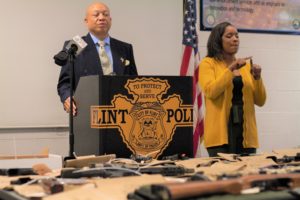
Mayor Sheldon Neeley announcing at Police Headquarters that the City will no longer auction off guns. (Photo by Tom Travis)
Standing at a podium in front of a display of 30 guns from small hand held guns to long rifles and assault weapons. Pointing to the table of guns Neeley said, “We have displayed here guns collected off the streets in the last seven days.” Looking somberly at the table of guns, Neeley added, “These are weapons of destruction.”
Noting the loss of revenue as the city stops auctioning guns Neeley added, “We have to ask ourselves how much is a life worth?”
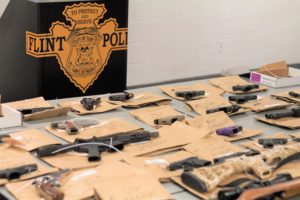
30 guns recently seized by Flint Police in routine traffic stops will no longer be auctioned off. The guns displayed will be destroyed by the Michigan State Police. (Photo by Tom Travis)
Neeley stated, “In the first eight months of this administration we have been doing a lot of clean up work to convey a more positive and productive mood.”
Beginning in 2017, under the Weaver administration, guns collected by the police department were auctioned off.
Neeley added, “To me and Chief Phil Hart and my administration we are going to stop that practice now. It shows a gross lack in critical thinking when you say we’re gonna fight crime and battle crime and take weapons off the streets and then to circulate weapons back into activity where people get a second chance at doing something they shouldn’t. We will not give opportunity to recirculate back into society,” even though he added, “We believe in the Second Amendment and the right to bear arms.”
Hart says the newly formed Special Investigative Unit targets City’s “hot spots”
Hart said the newly formed Special Investigative Unit picked up the guns over the past seven days. The Special Investigative Unit has been going to “hot spot areas.” Hart added most of the guns displayed on the table before him were confiscated in traffic stops. He clarified that the types of traffic stops were speeding, running a stop sign, and reckless driving.
Hart stated, “As you can see by the guns before you they are some pretty extreme weapons.” Hart noted some were brand new and added, “We are investigating why there so many new guns out on the streets. I’m working with our partners, both federal and local, to see which institutions are putting these guns out and ending up in the hands of people who shouldn’t have access to them. All that is being looked at.”
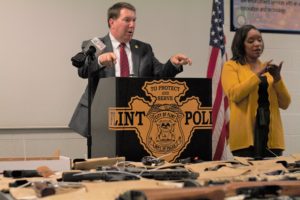
Chief of Police, Phil Hart, speaks at a press conference with Mayor Neeley announcing the City will no longer auction off guns. (Photo by Tom Travis)
Hart noted, “We are going out nightly to shooting scenes and this past weekend was horrible for all of us.” Referring to multiple shootings at Hallwood Plaza on Clio Road last weekend Hart added, “We’d like for nothing like that to ever happen again.”
Noting the impact of gun violence on society Hart said, “We have to think about the cost of this and so we can get into safety and well-being and what it does to our economy. The cost of seizing the weapons and re-seizing the weapons and the cost of medical procedures by the people impacted by these weapons. It’s extreme.”
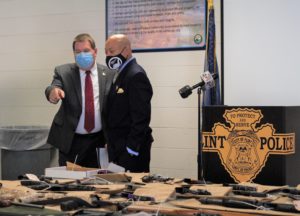
At Flint Police Headquarters, Chief of Police, Phil Hart and Mayor Sheldon Neeley look over a table of 30 guns seized over the last 7 days in routine traffic stops. (Photo by Tom Travis)
Hart said, according to a U.S. Congressional report estimate, “gun violence costs about $6.9 billion in Michigan. Which is about $696/resident per year. I can think of much better reasons to use our money than this kind of a thing.”
In a press release, Hart added, “Based on that average, the cost of gun violence in the city of Flint is at least triple the revenues the gun auctions.”
Hart also noted that the Police Department has received more than 70 applications for 14 vacant positions. Last year the City Council approved funding for the positions, and in June the Council approved additional 2 mils funding for added police services.
Anti-Gun Violence Activist Joseph Pettigrew says “gun violence is a public health crisis”
Joseph Pettigrew, whose father Sidney Pettigrew, was murdered in 2018, was invited to speak from the podium by Mayor Neeley. Pettigrew said, “gun violence is a public health crisis.” Since his father’s murder Pettigrew has begun an organization called “Communities Against Gun Violence.”
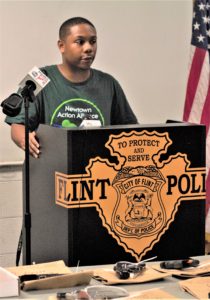
Anti-Gun Violence activist Joseph Pettigrew invited by the Mayor to speak at a press conference at Police Headquarters. (Photo by Tom Travis)
Pettigrew said the organization is made up of himself and other anti-gun violence activists in the city. “We started it in March to bring attention back to the issue of violence in the city of Flint.
“It takes people who have been through this type of tragedy to really step up and really let people know how it impacts people’s lives daily” Pettigrew said.
Pettigrew added, referring to the City’s decision to no longer auction off guns, “This is definitely a step forward.”
Neeley’s administration has a three-point plan to combat crime
- the formation of a Special Investigative Unit
- the recruitment of additional officers
- and a “no questions asked” gun buy back program.
Neeley said the gun buy back locations have not yet been announced. Neeley said, “my wife and I will be donating the first $1000 to the buy back program. We will also be asking others with like minded thinking to do the same.”
In a 2019 Newsweek article it was reported that “Americans own half of all guns in the world with approximately 120 firearms for every 100 U.S. residents.”
Research has shown that gun buy back programs yield little decline in crime. The Newsweek article noted, “A 2008 review of the existing research by Matthew Makarios and Travis Pratt in the journal Crime & Delinquency found that gun buyback programs have generally been ineffective in reducing crime in the U.S. Challenges include the types of guns purchased, the involvement of law enforcement, and the costs involved.”
EVM assistant editor and city beat reporter, Tom Travis, can be reached at tomntravis@gmail.com



You must be logged in to post a comment.